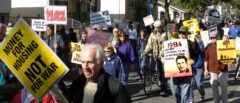February fifteenth, is the fifteenth anniversary of the largest peace protest in history. It spanned six hundred cities across the globe, and the Guinness Book of World Records said between 12 and 14 million people came out that day, making it the largest protest in the history of the world. A chorus of “not in our name” could be heard everywhere. What were they protesting? The invasion of Iraq.
“How can we say we want to drop bombs on our sisters and brothers, on our children?” - South African Archbishop and Nobel Peace Prize winner, Desmond Tutu, speaking at the New York City protest in 2003.
Weapons of mass destruction have played a key role in politics and protests well before the 2000’s though; The Nuclear Freeze campaign and the grassroots work put in by organizers, protestors and calls to Congress led Reagan to a complete turnabout. Reagan went on to sign the INF treaty, and laid the groundwork for the START treaty, even saying “To those who protest against nuclear war, I can only say: `I’m with you.’” In 2003 the outpouring of indignation against the invasion contributed to six vital countries on the United Nations Security Council refusing to support the US and Britain, and taking it one step further by pressuring the US to reverse course.
In the face of this pressure both the US under Bush and Britain under Tony Blair, pumped the brakes, though, unfortunately, only for a brief moment. Instead, Bush was the first President since Reagan not to work towards real denuclearization. In fact, he pulled out of the Antiballistic Missile Treaty while serving, leading to the creation of ballistic missiles and giving birth to the nuclear triad as we know it. In Bush’s hunt for weapons of mass destruction he merely left a legacy of warmongering, military spending and imperialism, a legacy no President should want.
Let’s take a moment to remember who pushed the hardest for an invasion of Iraq: John Bolton. In case you missed it, America’s on-again, off-again relationship with national security advisor Bolton isn’t like his always-off relationship with the United Nations. He made his views clear back in ‘94, saying “There is no United Nations. There is an international community that occasionally can be led by the only real power left in the world, and that’s the United States, when it suits our interests and when we can get others to go along.” Not much of a team player, huh? But that’s not nearly as bad as his 2002 statement, pushing for the invasion, “We are confident that Saddam Hussein has hidden weapons of mass destruction.” But it turns out, both Bush and Bolton were lying. In fact, there were a lot of lies told to us about the invasion of Iraq.
Grassroots organizing, through protests, letters and votes, will be a necessity as long as the government refuses to address the wishes of its citizens, and continues waging war. On this President’s Day weekend we must remember the impact of organizing on our leaders, both Reagan and Bush, and Presidents to come. The protests against the Iraq war were a part of an ongoing and historic battle for peace, bolstered by their predecessors, like the nuclear freeze movement, have all started with a call to turn out and raise our voices together, demanding as they did in 2003, that these wars will not, cannot, be fought “in our name.”


